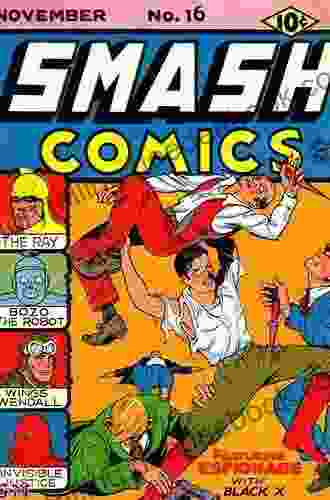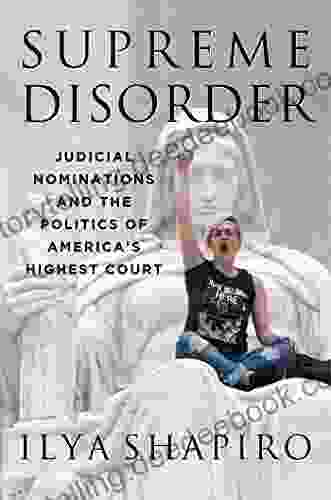Judicial Nominations and the Politics of America's Highest Court

The Supreme Court of the United States is the highest court in the land, and its decisions have a profound impact on the lives of all Americans. As such, the nomination and confirmation of Supreme Court justices is a highly political process, often involving intense debate and controversy.
In recent years, the politics of Supreme Court nominations have become even more contentious, as the Court has become increasingly divided along ideological lines. This has made it difficult for presidents to find nominees who can win the support of both parties in the Senate, and has led to several bitter confirmation battles.
4.6 out of 5
| Language | : | English |
| File size | : | 2671 KB |
| Text-to-Speech | : | Enabled |
| Screen Reader | : | Supported |
| Enhanced typesetting | : | Enabled |
| X-Ray | : | Enabled |
| Word Wise | : | Enabled |
| Print length | : | 399 pages |
The following article will explore the history and politics of Supreme Court nominations, and will analyze the factors that have contributed to the current gridlock in the confirmation process.
The History of Supreme Court Nominations
The process of nominating and confirming Supreme Court justices has changed little since the founding of the United States. The Constitution gives the president the power to nominate justices, and the Senate the power to confirm them. In the early years of the republic, the Senate typically confirmed presidential nominees without much debate or controversy.
However, in the late 19th century, the Senate began to take a more active role in the confirmation process. This was due in part to the growing power of the federal government, and the increasing importance of the Supreme Court in interpreting the Constitution.
The first major battle over a Supreme Court nomination came in 1869, when President Ulysses S. Grant nominated Edwin M. Stanton to be Chief Justice. Stanton was a controversial figure, and the Senate rejected his nomination by a vote of 35-29.
In the 20th century, the Senate continued to play an active role in the confirmation process. In 1916, the Senate rejected President Woodrow Wilson's nomination of Louis D. Brandeis to the Supreme Court. Brandeis was a progressive reformer, and his nomination was opposed by conservative senators.
In 1937, the Senate rejected President Franklin D. Roosevelt's nomination of Hugo Black to the Supreme Court. Black was a former Ku Klux Klan member, and his nomination was opposed by civil rights groups.
These early battles over Supreme Court nominations set the stage for the current gridlock in the confirmation process. In recent years, the Senate has become increasingly divided along partisan lines, and this has made it difficult for presidents to find nominees who can win the support of both parties.
The Politics of Supreme Court Nominations
The politics of Supreme Court nominations are complex and ever-changing. However, there are a few key factors that have contributed to the current gridlock in the confirmation process.
One factor is the growing polarization of the American electorate. In recent years, the two major political parties have become more ideologically distinct, and this has made it difficult for them to find common ground on Supreme Court nominees.
Another factor is the increasing importance of the Supreme Court in American life. The Court has the power to make decisions that have a profound impact on the lives of all Americans, and this has made it a target for political activists.
Finally, the media has played a significant role in the politicization of Supreme Court nominations. In recent years, the media has given extensive coverage to the confirmation process, and this has helped to raise the stakes for both presidents and senators.
The Future of Supreme Court Nominations
The future of Supreme Court nominations is uncertain. The current gridlock in the confirmation process is likely to continue, and it is possible that the Court will become even more polarized in the years to come.
However, it is also possible that the political climate will change, and that presidents will be able to find nominees who can win the support of both parties. Ultimately, the future of Supreme Court nominations will depend on the American people and the choices they make in the years to come.
The Supreme Court of the United States is a vital part of the American government, and the nomination and confirmation of Supreme Court justices is a highly political process. In recent years, the politics of Supreme Court nominations have become even more contentious, as the Court has become increasingly divided along ideological lines. This has made it difficult for presidents to find nominees who can win the support of both parties in the Senate, and has led to several bitter confirmation battles.
The future of Supreme Court nominations is uncertain, but it is clear that the politics of the confirmation process will continue to play a major role in shaping the Court for years to come.
4.6 out of 5
| Language | : | English |
| File size | : | 2671 KB |
| Text-to-Speech | : | Enabled |
| Screen Reader | : | Supported |
| Enhanced typesetting | : | Enabled |
| X-Ray | : | Enabled |
| Word Wise | : | Enabled |
| Print length | : | 399 pages |
Do you want to contribute by writing guest posts on this blog?
Please contact us and send us a resume of previous articles that you have written.
 Novel
Novel Chapter
Chapter Story
Story Library
Library Paperback
Paperback E-book
E-book Newspaper
Newspaper Paragraph
Paragraph Sentence
Sentence Bookmark
Bookmark Shelf
Shelf Bibliography
Bibliography Foreword
Foreword Preface
Preface Synopsis
Synopsis Annotation
Annotation Manuscript
Manuscript Scroll
Scroll Tome
Tome Bestseller
Bestseller Narrative
Narrative Biography
Biography Character
Character Resolution
Resolution Librarian
Librarian Borrowing
Borrowing Archives
Archives Periodicals
Periodicals Research
Research Scholarly
Scholarly Lending
Lending Academic
Academic Journals
Journals Rare Books
Rare Books Interlibrary
Interlibrary Literacy
Literacy Study Group
Study Group Thesis
Thesis Awards
Awards Book Club
Book Club Rachel M Harper
Rachel M Harper Natalie Diaz
Natalie Diaz Eduard H Hovy
Eduard H Hovy Ilya Shapiro
Ilya Shapiro Catalin Gruia
Catalin Gruia Jack J Kanski
Jack J Kanski Larry Sandberg
Larry Sandberg Matthew Dermody
Matthew Dermody Jeffrey Mcclain Jones
Jeffrey Mcclain Jones Jonathan Stutzman
Jonathan Stutzman Roger J Stone
Roger J Stone Deb Buckingham
Deb Buckingham Donald E Weatherbee
Donald E Weatherbee Mitsutoshi Inaba
Mitsutoshi Inaba Sharon Buydens
Sharon Buydens Andrew B Arnold
Andrew B Arnold Shane K Bernard
Shane K Bernard Frank Erickson
Frank Erickson Joan Johnson Freese
Joan Johnson Freese Vaddey Ratner
Vaddey Ratner
Light bulbAdvertise smarter! Our strategic ad space ensures maximum exposure. Reserve your spot today!

 Russell MitchellPast, Present, and Future of Mechanical Engineering: An In-Depth Exploration
Russell MitchellPast, Present, and Future of Mechanical Engineering: An In-Depth Exploration
 Juan Butler50 Essential Fingerpicking Songs for Guitarists: A Journey Through Timeless...
Juan Butler50 Essential Fingerpicking Songs for Guitarists: A Journey Through Timeless...
 Edmund HayesSmash Comics 16 Sheila Roberts: The Trailblazing Superheroine Who Deserves...
Edmund HayesSmash Comics 16 Sheila Roberts: The Trailblazing Superheroine Who Deserves...
 Chandler WardAwakening Your Inner Fire: A Journey to Find Passion and Purpose as an Asian...
Chandler WardAwakening Your Inner Fire: A Journey to Find Passion and Purpose as an Asian...
 Jaime MitchellUkulele Beginner to Brilliant: A Comprehensive Guide to Mastering the Happy...
Jaime MitchellUkulele Beginner to Brilliant: A Comprehensive Guide to Mastering the Happy... Sammy PowellFollow ·11.5k
Sammy PowellFollow ·11.5k Bruce SnyderFollow ·19.7k
Bruce SnyderFollow ·19.7k Julio CortázarFollow ·17.3k
Julio CortázarFollow ·17.3k Terry PratchettFollow ·16.8k
Terry PratchettFollow ·16.8k Will WardFollow ·15.8k
Will WardFollow ·15.8k Vernon BlairFollow ·11k
Vernon BlairFollow ·11k Trevor BellFollow ·9.9k
Trevor BellFollow ·9.9k Dwight BlairFollow ·6.2k
Dwight BlairFollow ·6.2k

 Howard Blair
Howard BlairClassical Music Themes for Easy Mandolin, Volume One
Classical Music Themes for Easy Mandolin,...

 Paulo Coelho
Paulo CoelhoThe Heretic Tomb: Unraveling the Mysteries of a Lost...
Synopsis In Simon Rose's captivating debut...

 Rodney Parker
Rodney ParkerThe Passionate Friends Annotated Wells: A Deeper...
Unveiling the...

 Ed Cooper
Ed CooperDelicious Stories of Love, Laughs, Lies, and Limoncello...
In the heart of...

 Elmer Powell
Elmer PowellHal Leonard Piano For Kids Songbook: Unleashing the...
Music holds immense...
4.6 out of 5
| Language | : | English |
| File size | : | 2671 KB |
| Text-to-Speech | : | Enabled |
| Screen Reader | : | Supported |
| Enhanced typesetting | : | Enabled |
| X-Ray | : | Enabled |
| Word Wise | : | Enabled |
| Print length | : | 399 pages |




